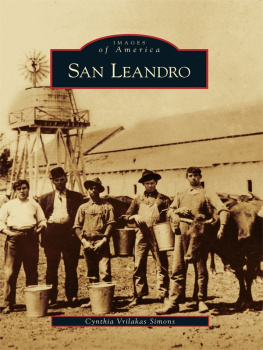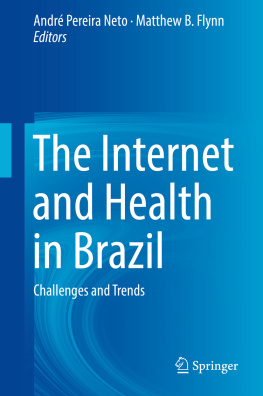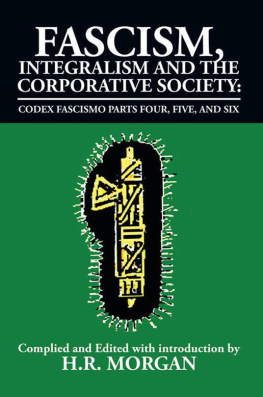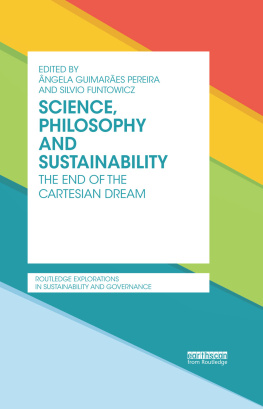Leandro Pereira Gonçalves - Fascism in Brazil: From Integralism to Bolsonarism
Here you can read online Leandro Pereira Gonçalves - Fascism in Brazil: From Integralism to Bolsonarism full text of the book (entire story) in english for free. Download pdf and epub, get meaning, cover and reviews about this ebook. year: 2022, publisher: Taylor and Francis, genre: Politics. Description of the work, (preface) as well as reviews are available. Best literature library LitArk.com created for fans of good reading and offers a wide selection of genres:
Romance novel
Science fiction
Adventure
Detective
Science
History
Home and family
Prose
Art
Politics
Computer
Non-fiction
Religion
Business
Children
Humor
Choose a favorite category and find really read worthwhile books. Enjoy immersion in the world of imagination, feel the emotions of the characters or learn something new for yourself, make an fascinating discovery.
- Book:Fascism in Brazil: From Integralism to Bolsonarism
- Author:
- Publisher:Taylor and Francis
- Genre:
- Year:2022
- Rating:5 / 5
- Favourites:Add to favourites
- Your mark:
- 100
- 1
- 2
- 3
- 4
- 5
Fascism in Brazil: From Integralism to Bolsonarism: summary, description and annotation
We offer to read an annotation, description, summary or preface (depends on what the author of the book "Fascism in Brazil: From Integralism to Bolsonarism" wrote himself). If you haven't found the necessary information about the book — write in the comments, we will try to find it.
Fascism in Brazil: From Integralism to Bolsonarism — read online for free the complete book (whole text) full work
Below is the text of the book, divided by pages. System saving the place of the last page read, allows you to conveniently read the book "Fascism in Brazil: From Integralism to Bolsonarism" online for free, without having to search again every time where you left off. Put a bookmark, and you can go to the page where you finished reading at any time.
Font size:
Interval:
Bookmark:

Fascism in Brazil analyzes the long and varied history of the Brazilian extreme right.
The book examines integralism, the main historical Brazilian fascist ideology represented by Brazilian Integralist Action, the largest fascist movement outside Europe. It analyzes the integralist tradition from its founding in 1932 to the present day. It examines how Brazilian Integralist Action began with its leader Plnio Salgados trip to Fascist Italy and how the Popular Representation Party developed integralism in the postwar era. The book also explores the support of integralists for the 1964 military coup and the role of integralists in the dictatorship. The contemporary extreme right in Brazil is still inspired by the integralist slogans of the 1930s as they seek to find political space and to demonstrate their strength. Contemporary turning points in neo-integralism were the involvement of neo-fascist groups, including neo-integralists, in the upheavals that culminated in the election of Brazilian President Jair Bolsonaro, as well as in the attack on the headquarters of comedy group Porta dos Fundos in Rio de Janeiro in 2019.
This book will be of interest to students and scholars researching comparative fascist studies, the history of the far right, and Brazilian and Latin American history and politics.
Leandro Pereira Gonalves and Odilon Caldeira Neto work in the History Department at the Federal University of Juiz de Fora, Brazil.
Series editors
Nigel Copsey, Teesside University, UK and Graham Macklin, Center for Research on Extremism (C-REX), University of Oslo, Norway
This book series focuses upon national, transnational and global manifestations of fascist, far right and right-wing politics primarily within a historical context but also drawing on insights and approaches from other disciplinary perspectives. Its scope also includes anti-fascism, radical-right populism, extreme-right violence and terrorism, cultural manifestations of the far right, and points of convergence and exchange with the mainstream and traditional right.
Titles include:
The Rise of the Dutch New Right
An Intellectual History of the Rightward Shift in Dutch Politics
Merijn Oudenampsen
A Transnational History of Right-Wing Terrorism
Political Violence and the Far Right in Eastern and Western Europe since 1900
Edited by Johannes Dafinger and Moritz Florin
The Blackshirts Dictatorship
Armed Squads, Political Violence, and the Consolidation of Mussolinis Regime
Matteo Millan
Male Supremacism in the United States
From Patriarchal Traditionalism to Misogynist Incels and the Alt-Right
Edited by Emily K. Carian, Alex DiBranco, and Chelsea Ebin
For more information about this series, please visit: www.routledge.com/Routledge-Studies-in-Fascism-and-the-Far-Right/book-series/FFR
Cover image: Dalila Varela Singulane
First published in English 2022
by Routledge
4 Park Square, Milton Park, Abingdon, Oxon OX14 4RN
and by Routledge
605 Third Avenue, New York, NY 10158
Routledge is an imprint of the Taylor & Francis Group, an informa business
2022 Leandro Pereira Gonalves and Odilon Caldeira Neto
The right of Leandro Pereira Gonalves and Odilon Caldeira Neto to be identified as authors of this work has been asserted in accordance with sections 77 and 78 of the Copyright, Designs and Patents Act 1988.
Proofreading and translation by V. A. Liebel Solues Lingusticas
This work has been supported by the Madrid Government (Community of Madrid-Spain) under the Multiannual Agreement with the Autonomous University of Madrid in the line of action encouraging youth research doctors, in the context of the V PRICIT (Regional Program of Research and Technological Innovation). (Reference SI1/PJI/2019-00257)

Research support from the Brazilian National Council for Scientific and Technological Development (CNPq) and the Foundation for Research Support of the state of Minas Gerais (FAPEMIG).
All rights reserved. No part of this book may be reprinted or reproduced or utilised in any form or by any electronic, mechanical, or other means, now known or hereafter invented, including photocopying and recording, or in any information storage or retrieval system, without permission in writing from the publishers.
Trademark notice: Product or corporate names may be trademarks or registered trademarks, and are used only for identification and explanation without intent to infringe.
Published in Portuguese as O fascismo em camisas verdes: do integralismo ao neointegralismo by FGV Editora, 2020
Every effort has been made to contact copyright-holders. Please advise the publisher of any errors or omissions, and these will be corrected in subsequent editions.
British Library Cataloguing-in-Publication Data
A catalogue record for this book is available from the British Library
Library of Congress Cataloging-in-Publication Data
A catalog record has been requested for this book
ISBN: 978-1-032-12447-6 (hbk)
ISBN: 978-1-032-12334-9 (pbk)
ISBN: 978-1-003-22457-0 (ebk)
DOI: 10.4324/9781003224570
Typeset in Bembo
by KnowledgeWorks Global Ltd.
Federico Finchelstein
There is no more opportune moment than the present to better understand the historical place of fascism in Brazil. The mix of authoritarianism, illness, and death caused by President Jair Messias Bolsonaro urgently presents us with the need to think about the danger of fascism in one of the world largest democracies. And this danger has a history.
In recent years, Brazil has gone from being an example and leadership for the region, and even the world, to being a leader in disease and a bad example of political leadership in democracy. In fact, Bolsonaro used a dual political and health crisis to improve his political position to the detriment of democratic functioning and the health of the population. This is not by chance, nor is it new. Like Donald Trump in the United States and many others, Bolsonaro denied the electoral legitimacy of their opponents. Leaders like him used falsehoods about systemic deception to create an alternative reality where they can rule, now or in the future, without democratic procedures. In this sense, Bolsonaro is not the typical populist but rather a wannabe fascist. Fascists destroy democracy. Populists, in contrast, used elections to stress their own democratic nature even when they advanced other authoritarian trends.
Like the United States, the Philippines, El Salvador, or much of Western Europe, democracy is in danger in Brazil. We cannot be sure that the admiration for dictatorships Bolsonaro expressed so many times will not eventually become a reality. As the history of fascism shows, if this type of project failed, it was not because of a lack of totalitarian will but because of the resistance of democratic sectors, independent media and also of all political sectors, including the non-fascist right wing. It is necessary to remember that while this would not be the first Brazilian dictatorship, it would not be the first fascist project for Brazil either. In this sense, it is necessary to read and learn from this new and excellent book on the history of Brazilian fascism written by two great experts on the subject: professors Leandro Pereira Gonalves and Odilon Caldeira Neto.
Font size:
Interval:
Bookmark:
Similar books «Fascism in Brazil: From Integralism to Bolsonarism»
Look at similar books to Fascism in Brazil: From Integralism to Bolsonarism. We have selected literature similar in name and meaning in the hope of providing readers with more options to find new, interesting, not yet read works.
Discussion, reviews of the book Fascism in Brazil: From Integralism to Bolsonarism and just readers' own opinions. Leave your comments, write what you think about the work, its meaning or the main characters. Specify what exactly you liked and what you didn't like, and why you think so.










